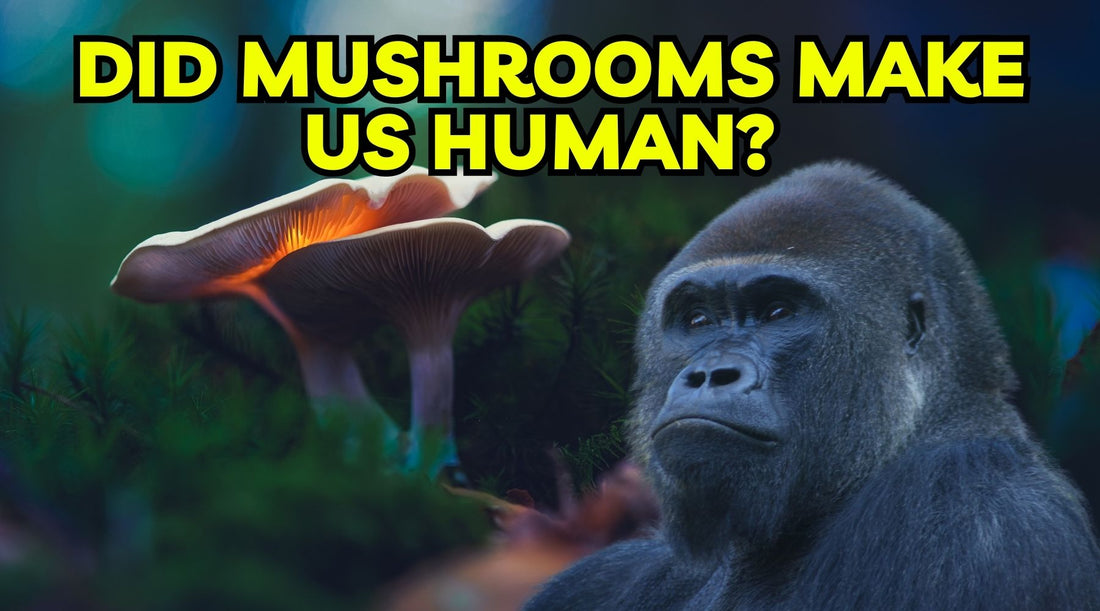
Did Mushrooms Make Us Human?

Ever wondered if those little shrooms could've turned us from regular apes into deep-thinking humans? Buckle up, because we're about to take a ride through evolution like you've never imagined. Yep, we're diving headfirst into the wild world of the Stoned Ape Theory – a funky idea that suggests those mind-bending mushrooms might have played a part in shaping our human story.
What's the Deal with Mushrooms Anyway?
Picture this: you're wandering through a forest, and you spot some colorful fungi poking out of the ground. But these aren't your average mushrooms – these are the psychedelic kind. The ones that can make you see things that aren't really there, and feel like you've unlocked the secrets of the universe. Turns out, people have been gobbling up these magical mushrooms for centuries, from ancient civilizations to modern-day psychonauts. It's like a journey to another dimension without leaving your backyard.
The Stoned Ape Theory Unveiled
Alright, hold onto your hats, because here's where things get really trippy. A dude named Terence McKenna cooked up this wild idea called the Stoned Ape Theory. He thought that our ancient ape ancestors stumbled upon these mind-altering mushrooms, chowed down, and suddenly – bam! – their brains started growing bigger and smarter. It's like they ate a cosmic brain booster and went from jungle jokers to deep thinkers. Sounds nuts, right? But that's the thing – sometimes the craziest ideas are the ones that make you think the most.
How Mushrooms Might Have Flipped the Evolution Switch
Let's get into the nitty-gritty. These mushrooms contain a little something called psilocybin – a chemical that messes with your brain in all sorts of fascinating ways. It's like a shortcut to expanding your mind. And get this – scientists think that psilocybin might have actually kickstarted our brain's evolution. Imagine your brain as a piece of clay, and psilocybin as the sculptor that shaped it into something more complex and creative. It's like upgrading your mental software, all thanks to a little fungus.
A Glimpse into the Shamanic Cosmos
Shift your focus to the mesmerizing tapestry woven by indigenous cultures across time and space. Picture shamans as cosmic navigators, traversing the landscapes of the mind through the vessel of plant medicines and shamanic rituals. In the heart of the Amazon rainforests and the vast deserts of Africa, these spiritual guardians have been unlocking the doorways to altered states of consciousness for millennia.
Their ceremonies, infused with the magic of psychedelic plants, unveil a world where boundaries blur, and the mundane dissolves into the mystical. These practices, handed down through generations, bear witness to the profound connection between humans and nature. It's as if they're tuning in to an ancient frequency, one that resonates with the very essence of the Stoned Ape Theory.
Could these rituals be fragments of a primordial wisdom, echoing the transformative encounters our distant ancestors had with psychedelic mushrooms? Imagine the shamanic cosmos as a living repository of insights, a realm where the spirit of exploration thrives. The resonances are undeniable – the same thirst for connection, the same yearning for enlightenment, and the same reverence for altered states that the Stoned Ape Theory dares us to explore.
Rewriting the Script of Natural Selection
In the grand theater of evolution, the Stoned Ape Theory emerges as a protagonist that demands a fresh lens through which to perceive our journey. Traditionally, the spotlight has shone on the survival of the fittest, with species gradually molding themselves to fit their environments over eons. But here's the twist – the Stoned Ape Theory introduces a new character into the plot, a character whose entrance sparks an explosion of cognitive fireworks.
Picture this: our ancestors, roaming the primordial landscapes, stumbled upon those mesmerizing mushrooms. As they ingested these fungal gateways, their consciousness underwent a cosmic renovation. It's like a lightning bolt of awareness struck, igniting neural pathways and expanding cognitive horizons in a geological blink.
So, let's reconsider the narrative. What if, amid the ebb and flow of biological adaptations, there existed moments of intellectual acceleration fueled by psilocybin's magic? These cognitive leaps could have been the X-factor that propelled our species towards dominance. The quest for survival, once guided by brawn alone, now intertwined with the kaleidoscopic dance of creativity and problem-solving.
The Stoned Ape Theory doesn't discard the principles of natural selection; it merely adds a symphonic layer to the orchestration. It's a narrative that champions the power of sudden enlightenment, where a cosmic handshake between human consciousness and psychedelic molecules reshaped the trajectory of our existence.
A Dance of Symbiosis
Nature has an intricate way of fostering symbiotic relationships, where different species coexist and influence each other's destinies. Consider the mycorrhizal networks that connect plants and fungi, sharing nutrients and information. Could our own relationship with psychedelic mushrooms be an ancient example of this symbiosis, with these fungi not only altering our minds but also shaping the course of our evolution?
Lessons from the Past, Insights for the Future
Beyond the realm of speculation, the Stoned Ape Theory encourages us to reflect on the intricate dance between consciousness, nature, and human potential. If mushrooms indeed played a role in our cognitive expansion, what does this revelation signify for our present and future? Are there ways we can harness the wisdom of these fungi to navigate the challenges of our modern world, fostering creativity, empathy, and a deeper connection to the ecosystem that sustains us?





